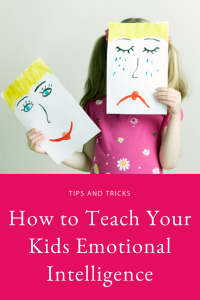 Amy Williams
Amy Williams
Journalist | Mom of Two
Twitter
Impulsive. Self-centered. Demanding. These terms are usually accurate descriptors of young children. Not because they are “bad” or spoiled,” but because these are intrinsic character traits of toddlers. Just like they have to be taught to read, write, and calculate, children have to be taught how to recognize and manage their emotions. The popular catch phrase for this is Emotional Intelligence. Simply put, emotional intelligence is the ability to recognize one’s own emotions, the emotions of others, and respond to them appropriately and accordingly.
EI, the common acronym for Emotional Intelligence, has been linked to higher academic success, increased pro-social behaviors, and higher levels of career satisfaction. Students tend to perform better overall in the classroom and have a lower dropout rate than those who do not exhibit appropriate emotional management. EI also leads to enhanced social behaviors including better ability to navigate relationships, being able to work cooperatively, and communicating more compassionately and appropriately. Later in life, higher levels of Emotional Intelligence have indicated boosted levels of career satisfaction, as well.
To effectively teach our children Emotional Intelligence, we need to start early. Many schools actively incorporate EI into their curriculums now. Having it reinforced in the educational arena is a huge bolster to strengthening and reinforcing EI, but it can start even earlier in the home. It is our job to model appropriate behaviors for our children and to advocate for them in the school setting, as well. Below are four simple ways to help raise emotionally intelligent children.
Talk to Them
From the time your children can respond to your voice, start talking to them about  feelings. This can range from cooing at a smiling baby, “You’re such a happy girl,” to expressing to your three year old you’re angry you broke your phone, for example. Label emotions using a rich vocabulary beyond just happy, sad, and mad. As they get older, introduce terms like frustrated, lonely, joyful, excited, and so on. Talk to them about why you are feeling the way you are so they link different situations and scenarios to emotions appropriately. In turn, ask them how they are feeling and try to get them to express why. The more you discuss emotions, the better understanding they will have of them and begin to recognize different emotions in themselves and in others.
feelings. This can range from cooing at a smiling baby, “You’re such a happy girl,” to expressing to your three year old you’re angry you broke your phone, for example. Label emotions using a rich vocabulary beyond just happy, sad, and mad. As they get older, introduce terms like frustrated, lonely, joyful, excited, and so on. Talk to them about why you are feeling the way you are so they link different situations and scenarios to emotions appropriately. In turn, ask them how they are feeling and try to get them to express why. The more you discuss emotions, the better understanding they will have of them and begin to recognize different emotions in themselves and in others.
Set Boundaries
Children need to clearly know your expectations. Set limits for acceptable behaviors and have consequences in place when they are not met. A key component of this, however, is to validate their emotions in the process. For example, perhaps your child asks for an unneeded item at the store. When you tell her no, she pitches a full out temper tantrum of tremendous scale. To help teach emotional intelligence, calmly respond her that you are not getting the item today. You understand this makes her angry, but the answer is no. Perhaps she can get the item another day for a special treat like a birthday or reward for accomplishing a goal, but we don’t purchase a new item every time we go to the store simply because it is wanted. This sets boundaries for shopping expectations, teaches needs vs. wants, and validates her emotions. It’s okay she is mad, but it doesn’t mean she’ll get what she wants or that the way she displayed her anger was appropriate.
Model Empathy
Often times what we do is more powerful than what we say. Remember to be a good EI example for your children. Let them see you helping someone who is in need or extending a kind word to someone who is feeling sad. Make it a regular practice to perform random acts of kindness, such as taking a sick neighbor some flowers from your garden or allowing someone to go in line before you. Help an elderly person in your community rake their leaves or give hand-me-downs to a local charity. Often times our actions teach better lessons than our words, so try to live by example and model healthy EI.
 Recognize and Praise Appropriate Behaviors
Recognize and Praise Appropriate Behaviors
When your child models a good choice or an appropriate behavior, be sure to recognize it and verbally praise him for it. This commonly is referred to as “catching them being good.” So often children only hear criticism about what not to do or how they did something wrong. Instead, when you see them picking up their toys without being asked or helping a sibling do something, acknowledge it. Simply stating, “I like the way you handled that. Nice job,” or giving them a high five when they do demonstrate good behaviors reinforces it and increases the likelihood of them repeating the behavior. This lets them know you saw what they were doing and recognized it positively. In the long run, this reinforces those small positive thoughts and gestures and helps them become natural reactions to everyday situations.
Children learn from everything around them, from things they hear to actions they see. They learn from our example and soak up what is modeled around them. Using simple techniques to demonstrate appropriate emotional responses and effectively manage our feelings is a powerful tool in teaching them emotional intelligence. The more they are exposed to it, the more natural and automatic it will become to them. In the long run, high emotional intelligence will benefit them academically, socially, and professionally, as well as enhance their overall happiness in life.
 About Amy Williams
About Amy Williams
Amy Williams is a free-lance journalist based in Southern California and mother of two. As a parent, she enjoys spreading the word on positive parenting techniques in the digital age and raising awareness on issues like cyberbullying and online safety. Follow Amy on Twitter here.
View all posts by Amy Williams here.







6 Comments on “How to Teach Your Kids Emotional Intelligence”
I feel this is so incredibly important, things like empathy, are qualities everyone should nurture at a young age. I spent just as mush time on my kids emotional intelligence
Thank you for your feedback Michelle and we are happy to hear of your success.
This is great! I have to remind myself to ask her what’s going on when she starts whining, which is often. I’d love her to voice why she’s upset. I haven’t given her high fives as often as I should be. Thanks for all the tips!
Sounds like you are doing all of the right things! Glad you enjoyed the article.
What a wonderful post for parents raising children!
Thanks for reading Kathy!